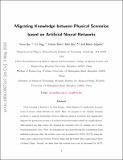Migrating Knowledge between Physical Scenarios Based on Artificial Neural Networks
Author(s)
Qu, Yurui; Jing, Li; Shen, Yichen; Qiu, Min; Soljacic, Marin
DownloadAccepted version (1.880Mb)
Publisher Policy
Publisher Policy
Article is made available in accordance with the publisher's policy and may be subject to US copyright law. Please refer to the publisher's site for terms of use.
Terms of use
Metadata
Show full item recordAbstract
© 2019 American Chemical Society. Deep learning is known to be data-hungry, which hinders its application in many areas of science when data sets are small. Here, we propose to use transfer learning methods to migrate knowledge between different physical scenarios and significantly improve the prediction accuracy of artificial neural networks trained on a small data set. This method can help reduce the demand for expensive data by making use of additional inexpensive data. First, we demonstrate that, in predicting the transmission from multilayer photonic film, the relative error rate is reduced by 50.5% (23.7%) when the source data comes from 10-layer (8-layer) films and the target data comes from 8-layer (10-layer) films. Second, we show that the relative error rate is decreased by 19.7% when knowledge is transferred between two very different physical scenarios: transmission from multilayer films and scattering from multilayer nanoparticles. Next, we propose a multitask learning method to improve the performance of different physical scenarios simultaneously in which each task only has a small data set. Finally, we demonstrate that the transfer learning framework truly discovers the common underlying physical rules instead of just performing a certain way of regularization.
Date issued
2019Department
Massachusetts Institute of Technology. Department of Physics; Massachusetts Institute of Technology. Research Laboratory of ElectronicsJournal
ACS Photonics
Publisher
American Chemical Society (ACS)